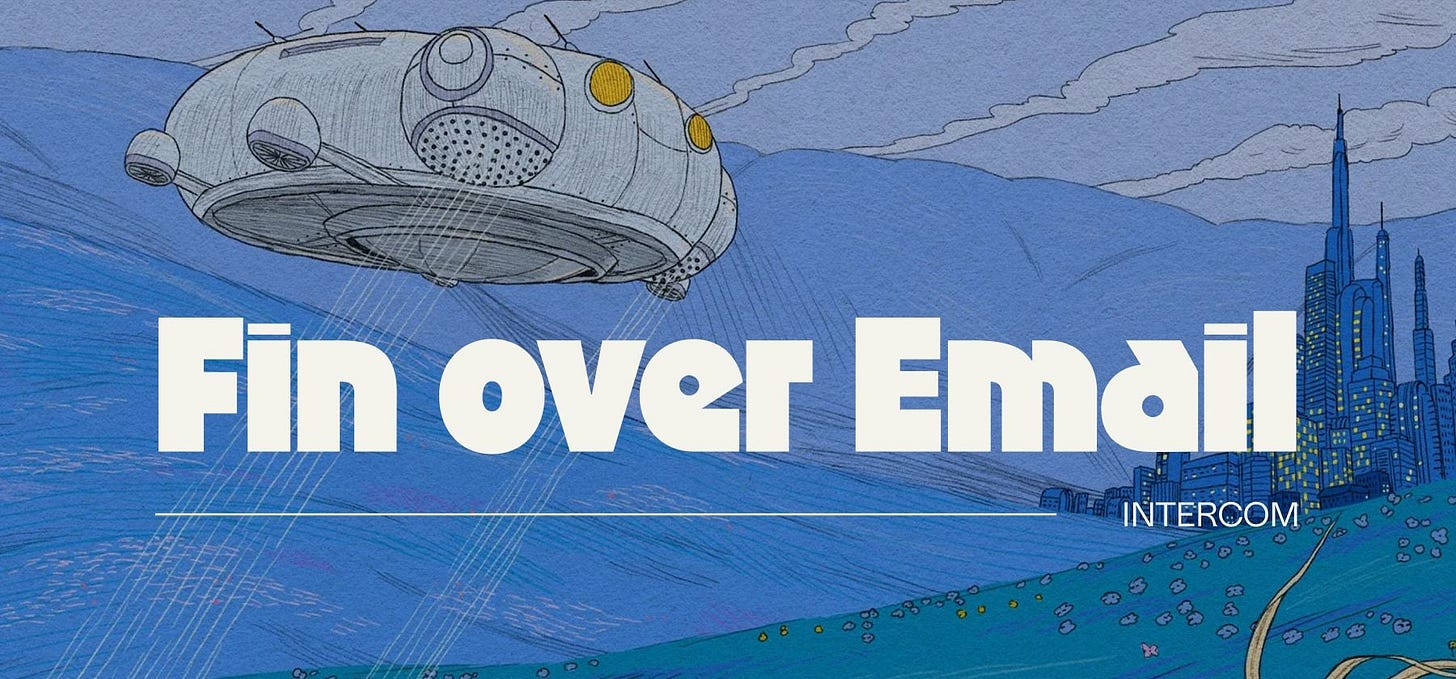Reimagining the future of AI
"The interesting question is actually not what's coming. The question is, when is it coming?"
As AI continues to evolve at a breathtaking pace, it's becoming increasingly clear that we're on the cusp of a technological revolution that will transform not just business, but society as a whole.
We knew it was crucial to address the challenges and opportunities this brings head-on, so earlier this year, we launched Off Script, a series of candid conversations with Intercom leaders about this extraordinary shift driven by AI.
In Off Script’s season finale, our CEO, Eoghan McCabe, shares his thoughts on how AI will revolutionize customer service, imagining a world where AI agents deliver extraordinary experiences that fundamentally reshape the way we interact with businesses.
Here are some standout takeaways from Eoghan’s episode.
The race for AI supremacy
The AI landscape is more competitive than ever, with companies racing to develop and deploy innovative solutions that will shape the future. As Eoghan puts it, "The interesting question is actually not what's coming. The question is, when is it coming?" The winners in this race will be those who can execute and deliver AI-powered products and services that redefine what's possible.
But what does this AI-driven future look like? Eoghan envisions a rapid evolution from narrow, task-specific AI agents to more general, adaptive systems that can learn and optimize on their own.
These "Generation 2" AI agents will break free of traditional interfaces and become truly autonomous, capable of engaging with humans in ways that feel natural and intuitive.
Collaborating with AI
One of the most fascinating aspects of AI's potential is its ability to augment and enhance human capabilities. As Eoghan notes, "The future is certainly not just humans, and I don't think the future is just bots either. It's going to be a beautiful mix of both."
We’re likely heading towards a world where AI serves as our greatest collaborator, working alongside humans to tackle complex challenges and push the boundaries of what's possible.
Disrupting industries and business models
As AI capabilities expand, entire industries and business models will be disrupted. As Eoghan says, “Everyone's going to figure out all of this stuff eventually, and what'll matter is who's able to actually build it and ship it first. So now we've got us and the big guys and the little guys all trying to reinvent themselves to become no longer software selling seats to humans doing the work, but software doing the work itself.”
Eoghan warns that companies relying on traditional approaches are under threat: "People talk a lot about the incumbents having these great benefits where they've got distribution and data and resources, whereas the little guys in AI don't have a chance of catching up. One of the great disadvantages is that they're set in their ways and they're fearful and they have big bases of shareholders that don't want to see them threaten their existing business."
The businesses that thrive in the AI era will be those that are willing to fundamentally rethink their strategies and introduce AI into the core of their strategies. This may require bold, even painful, transformations – but the alternative is irrelevance.
As Eoghan puts it, "If we're wrong, we'll have built all the wrong shit and we're in trouble. But if we're right, we'll at least survive, if not thrive."
The future is now
The AI revolution is no longer a distant prospect – it's happening right now. The question is, are you ready to be a part of it? Will you be one of the pioneers who shapes the future, or will you watch from the sidelines as the world changes around you?
The choice is yours. But one thing is certain: the future belongs to those who are willing to imagine, to innovate, and to embrace the incredible potential of AI. In Eoghan’s words: "What a time to be alive."
What’s coming up
Join us on November 26th at 9 am PDT for episode 4 of our webinar series Start Good Trouble, where we’ll be talking with Bobby Pinero, co-founder and CEO of Equals. We’ll be unpacking how to master SaaS metrics and deep-dive into a few fascinating areas, including:
The crucial role metrics play in navigating recurring revenue models.
Common pitfalls to avoid when evaluating and operationalizing metrics.
How to use metrics to tell a compelling business story that aligns with your strategy.
What we’ve been writing
Evolving Intercom’s database infrastructure
As Intercom continues to grow, scaling our databases to meet increasing demands has become a top priority. Our existing architecture, while serving us well, has faced challenges in connection management, maintenance windows, and sharding complexity.
To address these issues and future-proof our infrastructure, we've embarked on a migration to Vitess, a highly scalable MySQL clustering system, managed by PlanetScale. This decision promises to eliminate downtime, simplify database operations, and enable seamless horizontal scaling.
Ultimately, this will allow us to deliver even greater reliability, performance, and innovation to our customers.
If you're curious about the technical details and the challenges we faced, check out this article by Director of Engineering Ryan Sherlock to learn how we're revolutionizing our database architecture and setting the stage for Intercom's next decade of growth.
Fin over email: How we built a multichannel AI agent
Email remains a crucial channel for customer support, but it often leads to slower resolutions compared to real-time channels like live chat. At Intercom, we're changing that with the latest update to our Fin AI Agent – customers can now receive instant, AI-powered responses to their support emails.
Developing Fin for email presented unique technical and user experience challenges. Our team applied first principles thinking, conducted extensive research, and worked closely with customers to iterate and refine the solution.
From adapting our AI architecture to handle the intricacies of email to designing an intuitive user experience across various email clients, the journey was complex but rewarding. The results speak for themselves – Fin has already processed over 1 million end-user emails, automatically resolving more than 56% of them on average. 😱
Want to know how we did this? Staff Product Manager Julia Godinho shares more about our development process, the challenges we faced, and the results we achieved.
Calling all founders 📣
Join our Early Stage program to receive a 90% discount on Intercom's AI-powered support platform – which includes Fin, our game-changing AI bot capable of resolving half of your support volume, automatically. You’re in good company.
From the archive
The intersection of company and product strategy
The arrival of generative AI is forcing most tech companies to overhaul their strategy – but the principles of good strategy remain the same.
If you’re thinking about what goes into a great product strategy, here’s a conversation between our Co-founder and Chief Strategy Officer Des Traynor and our Chief Product Officer Paul Adams that’ll spark some inspiration.
In this podcast, they break down the six key elements of a successful strategy – a framework that we have evolved and adapted from Michael Porter’s famous paper “What Is Strategy?”.








